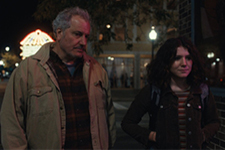Ghostlight
|  Ghostlight is the kind of film that may just revive your faith in not just the emotional wallop that movies can pack at their best, but the great potential of small-scale, deeply felt independent cinema. Cast with vaguely familiar faces who have spent most of their careers on the margins of mainstream cinema or in the world of theatre, Ghostlight is an intimate drama of grief and release, conflict and reconciliation that never soft-pedals the immense pain of loss while still insisting that wounds can heal, forgiveness can be offered and received, and art can a binding agent that bring us together. It is a hopeful film in the best sense of the word—not one that dolls out comfortable sentiment or easy answers, but rather one that mines deep truths from a well of familiar dramatic tropes that are made new again by intensely felt performances and a style that is perfectly attenuated in its directness. Keith Kupferer, who has played dozens of roles in television and film over the past two decades, most of which come with titles like “Lieutenant” or “Deputy” or “Detective” or “Agent,” stars as a melancholic construction worker named Dan who is struggling to stay connected with his wife Sharon (Tara Mallen), a schoolteacher, and his 16-year-old daughter Daisy (Katherine Mallen Kupferer), who has just been suspended from school for pushing a teacher. There is an unnamed tragedy lurking in the family’s recent past, one that haunts the film for the first hour before it slowly comes into focus, with details falling into place until we finally get a full sense of what has happened and how profoundly it has affected all of them. And, while such a narrative device plays just on the edge of indie-drama cliché, the manner in which it is handled both in terms of the screenplay’s careful structure and the powerful performances makes it work. While working one day, Dan meets Rita (Dolly De Leon), a short, hot-tempered woman who first gripes him out about all the sound his machinery is causing, but then invites him to join her community theatre group for a table read because they are one actor short (well, actually they are several actors short). Dan is understandably reluctant since the invite is so anomalous and he has no interest or experience in acting, but he agrees anyway and soon finds himself drawn into the eccentric troupe, which is composed of an amusing assortment of artistic oddballs, some of whom are more enthusiastic than talented, who are prepping a one-night-only performance of Romeo and Juliet. Dan’s inclusion in the group is about as unlikely as his eventual ascension to being cast as Romeo opposite Rita’s Juliet, but that is exactly what happens. And then, something even stranger happens: Dan begins to enjoy and relish his involvement in the theatre troupe even though he hides it from Sharon and Daisy. Being with the other actors and losing himself in preparing for the play give him respite from the pain of his life, which is intensified by a looming lawsuit he and Sharon have filed against another family that is related to their tragedy. Until now Dan has mostly drawn into himself, which has left Sharon feeling isolated and alone and caused Daisy to lash out with reckless and juvenile behavior that we sense is beneath her but is nevertheless her chief mode of expressing her own pain. Their shared sense of grief, conveyed so differently by each family member, eventually becomes part of the Romeo and Juliet production, whose narrative and themes reflect much of what Dan and his family are going through, to the point that Dan struggles with Shakespeare’s story because parts of it so closely mirror his own tragic experience. Ghostlight was co-directed by Kelly O’Sullivan and Alex Thompson from a screenplay written by O’Sullivan, who began her career as an actor before moving behind the camera writing and directing several short films. She has one previous feature screenplay, for Saint Frances (2019), which Thompson directed and she played the lead role (she also had a small role in Thompson’s most recent film, 2022’s Rounding). They eschew a lot of indie drama formula, grounding the film’s style in story and character, rather than showy camera movements or disjunctive editing. The cinematography by Luke Dyra, who is making his feature debut, is simple and direct, as is the gentle musical score by Quinn Tsan, who also scored Thompson’s previous two films. Most of the actors have worked with O’Sullivan and/or Thompson in previous films, and the synchronicity shows (it also helps that the family is played by an actual family, as Keith Kupferer and Tara Mallen are marrid in real life and Katherine Mallen Kupferer is their daughter). Everyone is clearly on the same page, working together in seamless fashion that allows the fundamental truths of pain and healing feel real in a way that is both heart-breaking and deeply optimistic. Copyright © 2024 James Kendrick Thoughts? E-mail James Kendrick All images copyright © IFC Films |
Overall Rating: 


 (4)
(4)


